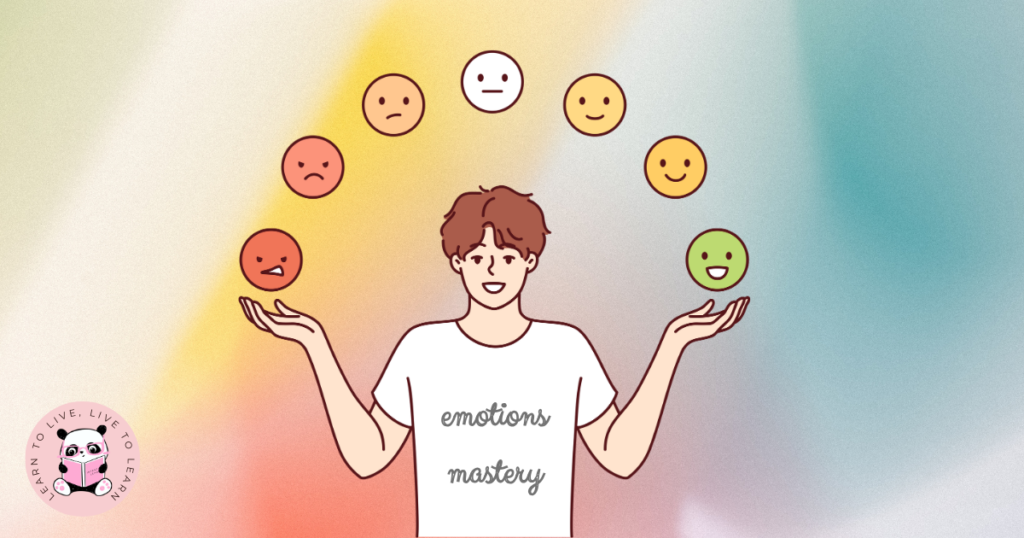The Art Of Keeping Calm: How To Manage Emotions Effectively
Written by Michelle Ong | March 29, 2024 | Wellness

Have you ever felt overwhelmed by panic or shame in tough situations? This article will show you how to manage these emotions and find calm and clarity, no matter how challenging things get.
“Very little is needed to make a happy life; it is all within yourself, in your way of thinking.”
Marcus Aurelius
Ever felt a twinge of jealousy when someone else succeeds, or struggled to keep your emotions in check during stressful situations? It’s common to feel frustrated or anxious when things don’t go as planned. Managing your emotions effectively is key to staying composed and handling challenges with grace.
Just as a musician conducts a symphony, mastering your emotions helps create harmony in your life, guiding you through difficulties with inner peace and resilience. In this post, we’ll explore ways to navigate life’s challenges with clarity and composure.
1. Objectify
When strong emotions arise, pause to name them—whether you’re feeling angry, anxious, or a mix. Identifying your emotions helps you observe them from a distance, like shining a light to see them more clearly. By objectifying your emotions, you examine them without being overwhelmed, making intense feelings more manageable. Acknowledge them with curiosity and compassion, recognizing that they are like passing clouds in the vast sky of your mind.
Next time you feel overwhelmed, name and define your emotion. Observe it and watch its power over you lessen. This simple act of emotional self-awareness can lead to inner peace.
2. Rationalize
“Pain is certain, suffering is an option.”
Buddha
Negative emotions can weigh us down, but we have the power to rise above them. When those feelings start creeping in, pause and reflect. Remind yourself that adding negativity won’t help and that tomorrow can be better if you approach today constructively.
Challenge yourself to be positive. Ask, “Will I remember this in 10 years?” or “How can I handle this better?” Take a deep breath, count to ten, or step away for a moment. Identify what triggered your feelings to address it effectively and prevent future issues.
Be patient with yourself. Mastering emotions takes time, and it’s okay to stumble. Keep trying and pushing forward. Release negative emotions like a bird set free, take time to center yourself, and remember, you’re stronger than you think.
3. Simplify
“Do not dwell in the past, do not dream of the future, concentrate the mind on the present moment.”
Buddha
When you’re caught up in negative emotions, keep it simple. Avoid overthinking and focus on clarity and peace. Reflect on what truly matters—your dreams and goals. Are your feelings clouding your judgment or exaggerating the situation?
Shift into solution mode. Let go of the need to be right and release those heavy emotions. View the situation objectively, like watching from afar, and avoid blame. Remember, people are focused on themselves, not on you. Focus on solutions, not who’s right or wrong. Take a deep breath, release the negativity, and stay focused on your goals. You’ve got this.
4. Courage
Face your negative emotions head-on instead of ignoring them. Acknowledging feelings like shame, anger, or disappointment gives you strength and inner peace. When you face your fear, you will realize that nothing is ever as hard as you think.
For example, after a failure, it’s easy to push away feelings of embarrassment. But confronting them allows you to learn and grow. Every day is a new chance to try again, and setbacks are part of the journey. Embrace vulnerability, make mistakes, and use them to fuel your growth. Remember, the courage to face your fears will help you overcome challenges and succeed.
5. React Differently
People often project their fears and limitations onto others. To protect yourself, focus on staying calm. When faced with manipulation or provocation, take a step back and pause before reacting. Change your perspective and behavior by choosing a thoughtful response over an emotional reaction. For example, if you’re tempted to react angrily, excuse yourself politely and take time to cool down.
If you find yourself always prioritizing someone who doesn’t reciprocate, reassess their role in your life. Set healthy boundaries and prioritize relationships that respect and value you. Remember, you deserve to be treated with the same respect you give others.
6. Sense Of Self
“The tranquility that comes when you stop caring what they say. Or think, or do. Only what you do.”
Marcus Aurelius
Don’t let others’ opinions dictate your life. Focus on the present and stay true to yourself. Criticism or negativity from others often reflects their own insecurities, not your worth.
Instead, build your self-awareness by reflecting on your values, strengths, and areas for growth. Embrace your uniqueness and celebrate who you are. Surround yourself with positive influences, practice self-care, and set boundaries to protect your well-being.
Learn from setbacks, trust your instincts, and pursue your dreams with confidence. Your journey is yours to shape, guided by your core values and beliefs. Embrace your authenticity, and you’ll find fulfillment and meaning along the way.
7. Listen
“To understand everything is to forgive everything.”
Buddha
In the chaos of life, we often forget the power of truly listening. By giving others our full attention, we open ourselves up to empathy, understanding, and deeper connections.
We have two ears and one mouth for a reason—listening more than we speak helps us grasp the essence of what others are saying. When faced with criticism or conflict, resist the urge to defend yourself. Instead, listen to understand their perspective, which can defuse tension and provide valuable insight.
Genuine listening strengthens relationships and fosters empathy. So, let’s make an effort to listen with an open heart and mind, enriching our connections with others and ourselves.
8. Accept
Our surroundings can affect our emotions, but it’s our attitudes and perceptions that truly shape how we feel. Emotions often arise from our attachments to outcomes or situations. To regain control, embrace the transient nature of life and our feelings. By accepting that everything, including emotions, is temporary, we can better manage our emotional well-being.
In life, it’s important to accept what’s done, whether it’s your fault or not. Instead of dwelling on the past, focus on finding solutions. Acceptance means facing challenges with resilience and grace, not expecting the worst.
Acknowledge your emotions without judgment and express them in healthy ways. Take time to assess situations and choose the right moments to share your feelings thoughtfully.
By embracing acceptance, you reduce unnecessary suffering and navigate life’s ups and downs with calm and strength. Setbacks are part of the journey, and with patience and a positive mindset, you can manage challenges effectively and find peace amidst the chaos.
9. Walk Away
The hardest thing to learn in life is to decide which bridge to cross and which bridge to burn.
In life, it’s sometimes wise to step back from situations and relationships that are beyond your control. If someone mistreats or disrespects you, it’s okay to walk away. Persisting in toxic environments can cause more harm, so disengaging from conflicts and not stressing over every issue is crucial for your peace of mind.
You don’t need to react to every bit of drama or have an opinion on everything. Focus on what truly matters to you and your well-being. Let go of relationships that no longer serve your happiness and surround yourself with supportive, positive people.
Remember, you can’t control others, so don’t waste time on negativity. Prioritize your mental and emotional health, filter out the noise, and embrace forgiveness and growth for inner peace.
10. Humility
Humility is key to managing negative emotions. It helps us stay open to learning and growing, keeping our ego in check and preventing impulsive reactions driven by pride. By embracing humility, we can approach challenges with curiosity rather than entitlement, fostering understanding and compassion. This perspective helps us handle difficult emotions better and maintain inner peace.
Remember, leaning on friends, family, or a therapist can also provide perspective, clarity and support when you’re struggling.
11. Manage Stress
Stress often triggers negative emotions and poor reactions. To keep your emotions in check, prioritize stress management. Engage in activities that reduce stress and practice self-care—get enough sleep, exercise, and eat well. For more tips, check out this article on self-care. Remember, stressing out only adds to your problems, so focus on what matters and let go of unnecessary stress.
12. Philosophy
Stoic philosophy teaches us to master our emotions and find inner peace despite life’s challenges. It emphasizes maintaining calm in the face of adversity and choosing our reactions rather than being controlled by external circumstances. For example, if you’re stuck in traffic and running late, instead of getting frustrated, take a deep breath and remind yourself that delays are part of life. Stoicism also encourages compassion, introspection, and rationality. It’s about navigating life’s storms with a steady mind and understanding others are facing their own struggles.
Similarly, Japanese and Zen philosophies offer practices like chado, kodo, and shinrin-yoku to help manage emotions and reduce stress through mindfulness and relaxation. These practices can provide moments of serenity and emotional balance. For more on these transformative methods, check out related posts.
Embark On Your Transformative Journey
“Calmness is the cradle of power.”
Josiah Gilbert Holland
Mastering your emotions is like controlling a flame—it can guide you to your best self. This process demands patience, self-discipline, and courage. While understanding emotional control is the first step, consistently applying it is key and varies for everyone. With dedication, you’ll grow stronger and wiser over time. The journey is challenging, but the rewards are worth it.
Did this article resonate with you? Like and share it with your family and friends, and follow me on Pinterest to always be updated on my new articles!


